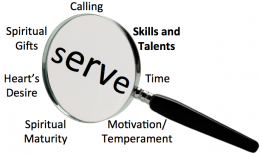 Having identified what skills and talents people have to offer how do we mobilise them?
Having identified what skills and talents people have to offer how do we mobilise them?
Ability
It is helpful to have some grading about expertise, as illustrated here with ‘Level of skill’. Not only does this give a feel of the experience and quality of work that someone can bring but it also identifies where there is an opportunity for further training.  Often working together using your skills gives a wonderful opportunity for equipping someone else and for discipleship.
Often working together using your skills gives a wonderful opportunity for equipping someone else and for discipleship.
A few years ago two of the wives of elders in our church regularly invited young single women to their homes to teach them about home-making and enjoy their friendship, a reminder of the teaching in Titus chapter 2 for older women to help younger women. I now see well-equipped married women who have benefitted hugely from such training!
Application
There are some skills that are obviously needed in the life of a church, such as school teaching and administration. However, care must be taken that, if someone is using this skill in employment outside the church they may not wish to use the same skill on, say, a Sunday with the children’s ministry.
Creative ways of using skills and talents
Sometimes a little creativity is needed to harness skills, especially where time is a challenge (I will write more about time in due course). Here are a few ideas.
- Working from home. Often women feel they wish to be involved but, due to the important role they fulfil in bringing up their children they feel somewhat housebound and cannot commit to a particular timetable or place of ministry. But some activities, such as certain aspects of administration, can be carried out at home. As an example, the Disclosure and Barring Service (DBS) checks (previously CRB checks) needed for children’s workers are processed in our church by someone who is home based.
- Flexi-time. Increasingly people in the UK have the opportunity to work flexi-time, allowing them to work, say, all the necessary hours in four days which releases a day per week to serve the church. We now have several people who have adopted this model and some of the meetings, such as pastoral reviews, are planned to accommodate the day on which the relevant people are available.
- Tithing of skills. Some skills, such as those in the building trade, are much needed by people who are in some way poor or isolated; elderly people or single parents. How about encouraging such skilled people to tithe their time to help those who are less fortunate?
- Training. There are always people who want to learn more or who lack confidence to use their skill. As data is collected on people’s skills it may be helpful to allow people to specify if they would like to be trained (‘Desire to learn’ in the chart above). It is then possible to put them into a context of serving which will give them added skills and confidence. An example is the discipling of younger women by older ones, cited above. They inevitably pick up many other values and are equipped to serve not only their families but the wider church and beyond.
Life in the church is not formulaic. It is important to be creative and harness the skills that God has given through his people. This produces a fluid, constantly changing and satisfying church life that is both effective internally and attractive to the outside world.
